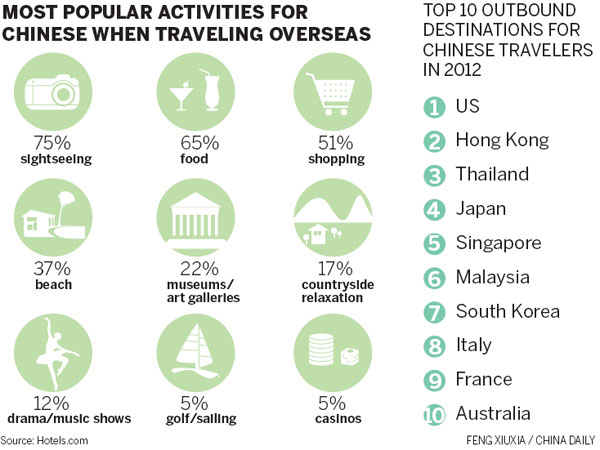Affluent tourists 'go it alone'; seek culture, good food
Updated: 2013-08-22 07:42
By Xu Junqian in Shanghai (China Daily)
|
|||||||||||
As Chinese tourists get richer, they're shunning group tours and striking out on their own, a leading hotel booking website said in a study released on Wednesday.
Texas-based Hotels.com said Chinese tourists' overseas expenditure jumped 40 percent last year to $102 billion. That surge took China past the United States and Germany to become the world's top outbound tourism spender.
The website said it based its figures on a report by the United Nations World Tourism Organization.
Hotels.com handles bookings for about 220,000 properties around the globe.
The website said that more than 60 percent of Chinese outbound tourists prefer to travel individually, rather than as part of a group.
A key finding of the 2013 report "is the way that Chinese travel, which is the trend of what we call FIT, free and independent travel", Johan Svanstrom, managing director of Hotels.com Asia-Pacific, told China Daily in Shanghai.
The hoteliers interviewed confirmed the trend, saying 70 percent of their Chinese guests are alone, compared with 50 percent in the previous survey.
The survey questioned 3,000 Chinese men and women who went abroad at least once in 2012 and more than 1,500 hoteliers worldwide.
China's outbound tourists totaled 83 million in 2012, making it the largest tourism source country in the world, according to the UN study.
The China Tourism Academy has forecast that by 2020, Chinese people will make 200 million overseas trips every year.
Earlier this year, the State Council issued the Outline for National Tourism and Leisure (2013-20), which aims to boost outbound tourism by encouraging companies to improve the use of paid leave.
Nearly half of the hoteliers interviewed by the website expect to see double-digit growth in the Chinese market in the next three years, while 10 percent believe the growth rate will exceed 50 percent.
While shopping continues to take up a fairly large share of Chinese tourists' expenditure, Svanstrom said spending on meals, hotels and sightseeing is quickly catching up.
"The Chinese market has more experienced travelers, who have made enough trips to Hong Kong and Macao and bought enough watches and bags. They now want to experience the beaches, the temples ... some exotic culture and culinary things," he said.
The Beijing-based luxury research center Fortune Character Institute has offered a similar perspective. It estimated that luxury shopping now accounts for about 40 percent of overseas expenditure by Chinese tourists, but it said that proportion will fall by half in the next five years.
That's not because the Chinese are spending less on designer bags or scarves, but because they're paying more visits to Michelin-starred restaurants and jungle safaris, Zhou Ting, dean of the institute, pointed out.
As a result, there will be, if there isn't already, a disconnect between the needs of Chinese travelers and what's offered by overseas hotels.
Three-quarters of the survey respondents said they are looking forward to seeing Chinese-language facilities and 42 percent want more Mandarin-speaking hotel staff.
xujunqian@chinadaily.com.cn

(China Daily 08/22/2013 page13)
Today's Top News
Foreigners nabbed for personal info trafficking
Caution urged in online reporting of violence
Group renting debate revived by boy's death
Public mixed over changes to train ticket returns
Concerns of growth at cost of environment
Scientists want stricter control of bird markets
Metro offers passengers books to borrow
Beijing seeks to cement relations with Singapore
Hot Topics
Lunar probe , China growth forecasts, Emission rules get tougher, China seen through 'colored lens', International board,
Editor's Picks

|

|

|

|

|

|





